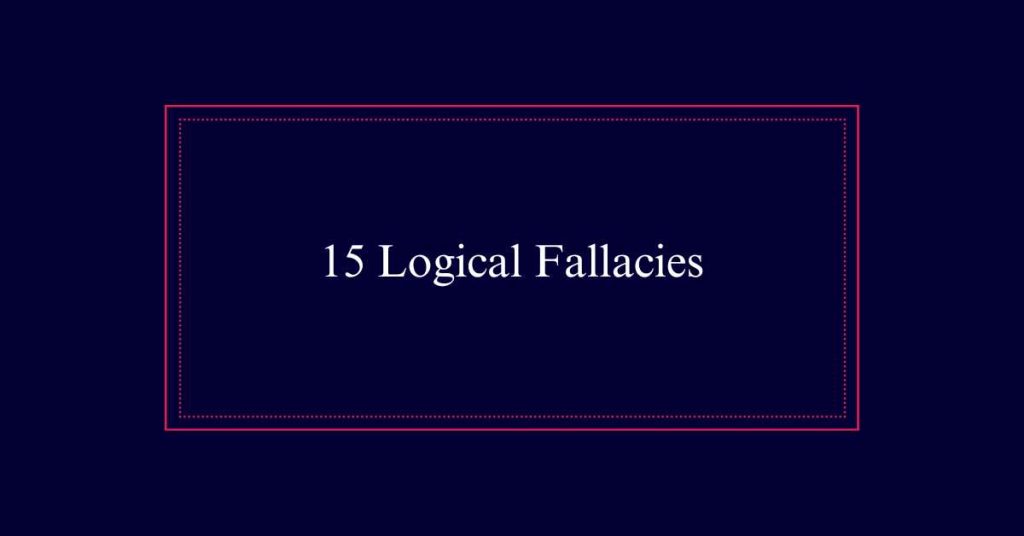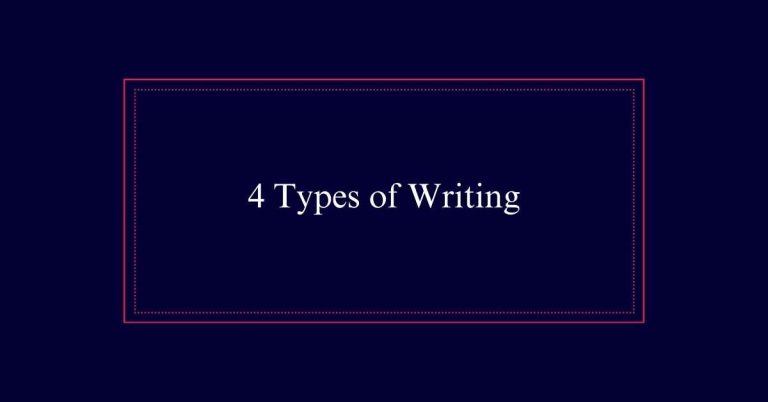What is a logical fallacy? 15 Types explained
You’re gonna learn about sneaky mind tricks people use to try and win arguments, even when they’re totally wrong!
What is a logical fallacy?
A logical fallacy is a flaw in reasoning that renders an argument invalid or ineffective. Logical fallacies are errors in the logic or reasoning behind an argument that cause the stated conclusion to be unsubstantiated or unsound.
There are many different types of logical fallacies, such as ad hominem attacks, red herrings, straw man arguments, equivocation, slippery slopes, and many others.
Falling victim to logical fallacies can lead to faulty conclusions, misunderstandings, and an inability to properly evaluate evidence or persuade others.
Logical fallacy types

Ad Hominem Fallacy
You’re a big meanie who calls people names instead of addressing their actual arguments! That’s called the ad hominem fallacy.
It means you attack the person rather than their argument. For example, if I said, ‘Jane’s idea is dumb because she’s an ugly loser,’ that would be an ad hominem fallacy. I’m insulting Jane personally instead of providing a real reason why her idea is flawed.
This type of fallacy is super common and really dumb. Rather than saying, ‘Your idea is stupid because you have a funny haircut,’ you should say something like, ‘I disagree with your idea because of X, Y, and Z reasons.’ That way, you’re challenging the actual logic of the argument and not resorting to mean name-calling.
Red Herring Fallacy
Ooh, the red herring fallacy is when someone throws in a random, unrelated point to distract from the main argument!
It’s like if you’re arguing about what movie to watch and your friend’s like ‘But what about that cool rock I found outside?’ Totally not related, right? The red herring tricks you into focusing on something completely different instead of the actual debate.
You gotta watch out for those silly distractions! If someone starts rambling about irrelevant topics, they’re probably using a red herring to avoid addressing the main point. Don’t fall for it! Stay focused on the true argument and don’t let ’em pull a fast one on ya with random tangents and shiny objects.
Keep your eye on the prize, champ!
Straw Man Fallacy
So, the straw man fallacy is when you misrepresent someone’s argument and then argue against that instead of their actual point? Yup, that’s it!
It’s like if your friend said, ‘I think we should get ice cream,’ but you responded by saying, ‘No way, we can’t have ice cream for every meal! That’s just silly!’ You made up an extreme version of their argument to make it sound dumb.
That’s a straw man – you created a distorted, exaggerated ‘straw man’ version of their argument that’s easy to knock down, instead of addressing what they really said. It’s a sneaky trick that allows you to avoid engaging with the actual point.
Just respond to the real argument next time, ya big dummy!
Equivocation Fallacy
Speaking of sneaky tricks, the equivocation fallacy uses a word with multiple meanings to trick you. You think the word means one thing, but the person saying it means something else!
It’s like when your friend says ‘Let’s get some food,’ and you think they mean going out to a restaurant, but they really just wanted a snack from the kitchen. Tricky!
The equivocation fallacy is all about using a word that can mean different things in different situations. It’s super confusing and can make arguments seem stronger than they really are.
Slippery Slope Fallacy
You’ll sometimes hear folks take a tiny thing and blow it up into a huge, scary situation – that’s the slippery slope fallacy!
It’s when someone says ‘If we allow A, then B will happen… and then C… and then D… until we end up with some crazy, extreme outcome!’ But that’s just being silly.
Things don’t always have to go from bad to worse like that. Each step needs proof that it’ll really lead to the next. Without evidence, it’s just making a mountain out of a molehill.
Causal Fallacy
Another silliness you might come across is the causal fallacy. It’s when people think that just ’cause one thing came before another, it must’ve caused it!
But that’s not always true, is it? Like, if I ate an ice cream cone and then got a tummy ache, the ice cream didn’t necessarily make me sick. It could’ve been something else entirely!
Silly people use this dumb fallacy to try and link things together without any real proof. It’s just lazy thinking. Don’t fall for it!
Make sure there’s actual evidence showing one thing really did cause the other before believing someone’s goofy claims. Use your brain and don’t be a dummy!
Tu Quoque Fallacy
Frequently, instead of addressing an argument’s merit, people respond with a ‘you too’ critique, which is the tu quoque fallacy. It’s basically when you say something like ‘well you did it too!’ instead of dealing with the real issue.
It’s super dumb and just makes you look like a baby who can’t have a real discussion. It’s like if your mom says ‘don’t eat cookies before dinner’ and you go ‘but you ate a cookie yesterday!’ Like duh, that doesn’t make it okay for you.
You’re just trying to deflect and shift blame instead of owning up. It shows you don’t actually have a good counterargument. The mature thing is to stay focused on the topic, not bring up irrelevant stuff about the other person. Otherwise you just come across as immature and unable to debate properly.
False Dichotomy Fallacy
A false dichotomy fallacy limits choices to just two options when there are actually more. It’s so silly and childish to think the world is that black and white.
Like when mommy says you can either eat your veggies or go to bed with no dessert. But what if you want a third option, like having a yummy fruit salad instead?
Grown-ups do this fallacy too when they oversimplify complex issues. They’ll be like ‘You can support my plan or let the economy crumble!’ But hello, there’s gotta be other ways to fix things besides their dumb idea.
Don’t fall for this trap! The world’s not that simple, so don’t let people force you into fake either/or choices.
Circular Reasoning Fallacy
Circular reasoning, the dumb idea that an argument supports itself, is a big no-no! Duh, that doesn’t make any sense!
For example, if your mom says you can’t go out because she said so, that’s circular reasoning. She can’t just use her own words as proof – that’s silly! Good arguments need real evidence and logic to back them up.
Circular reasoning is just going around in circles, like a dog chasing its tail. Don’t be that dumb dog! Learn to spot this fallacy and call it out. Demand real reasons and explanations, not some stupid circle of words that goes nowhere!
You’re basically saying: ‘It’s true because it’s true!’
Appeal to Authority
Another lame fallacy is when you say something’s true just ’cause some fancy person said so. It’s called the ‘Appeal to Authority’ fallacy, and it’s dumb.
Just ’cause Einstein or the President or some celeb says it doesn’t make it right, you gotta use your brain! They could be wrong or lying.
You gotta ask for proof and evidence and not just believe them ’cause they’re famous or ‘an expert’. Don’t be a sheep and blindly follow, think for yourself!
Question everything and everyone. Authorities can be biased or mistaken, so demand facts, not just their word.
Being an ‘authority’ doesn’t mean they can’t be wrong.
Appeal to Emotion
You’re being a big cry-baby if someone tries to win an argument by making you feel bad or scared. That’s called an ‘appeal to emotion’ fallacy – they’re using your feelings against you instead of facts. It’s a dirty trick that meanies use when they can’t win fair and square.
This fallacy makes you feel guilty, angry, or terrified so you’ll agree with their dumb point. Like if I said ‘Don’t eat cookies or you’ll get FAT and ugly!’ That’s just manipulating your fears to shut you up.
Real men use logic and proof, not scary stories. Next time someone pulls that crud, call them out for being a big baby who can’t debate properly. Stick to the facts and don’t let them jerk your chains!
Bandwagon Fallacy
Everyone’s doing it, so you should too – that’s the Bandwagon Fallacy‘s big trick!
The Bandwagon Fallacy goes: ‘If many people do something, it must be right or good.’ But that’s dumb! Just ‘cuz lots believe something doesn’t make it true. Crowds can be wrong too, ya know?
You’ve heard it before, right? The kids at school say vaping is cool ‘cuz all the popular ones do it. Or your friends wanna skip class ‘cuz everybody’s ditching anyway. It’s peer pressure on steroids!
No True Scotsman
A classic fallacy you’ve probably heard is the ‘No True Scotsman’ ploy. It’s when someone makes up dumb excuses to protect their original silly claim.
Like if you said, ‘No Scotsman puts sugar on his porridge’, and I said, ‘But my friend Angus does that and he’s Scottish.’ Then you’d be all, ‘Oh, well no TRUE Scotsman would do that!’ So you’re saying that anyone who disagrees with you isn’t a real ‘whatever’ you claimed.
It’s just a cheating way to never be wrong. Avoiding evidence that proves you wrong is super lame. Next time, just admit you were mistaken instead of making up fake rules about who can or can’t be included in your original dumb statement.
Argument From Ignorance
Another lame fallacy you’ll see dimwits use is the ‘Argument From Ignorance.’ This one’s dumb and simple – basically, they’re saying something must be true ’cause we can’t prove it’s false. Like, ‘Bigfoot exists ’cause no one can prove he doesn’t!’
Duh, that’s just silly. The burden’s on THEM to provide evidence Bigfoot is real, not others to disprove it. It’s shifting the burden of proof, acting like lack of proof against their claim means it’s automatically valid.
Don’t fall for this bonehead move! If someone can’t back up their wacky idea with actual evidence, just tell ’em to put a sock in it until they can prove their crazy point. Ignorance doesn’t prove jack squat!
Composition/Division Fallacy
You’re probably thinking, ‘What the heck is this ‘Composition/Division Fallacy’ thing?’ It’s when someone says silly stuff like, ‘Apples are fruit, fruit is sweet, so all apples must be super sweet!’ Nope, that’s dumb. Not all apples are sugary treats. That’s the ‘composition’ part – you can’t take one part of a thing and say it’s true for the whole thing.
The ‘division’ side is the opposite – saying if something is true for the whole, it must be true for the parts too. Like, ‘Americans are human, I’m American, so I must be able to breathe fire like humans can!’ Uh, no dummy, humans can’t breathe fire. Don’t fall for this fallacy trap of making goofy assumptions!






